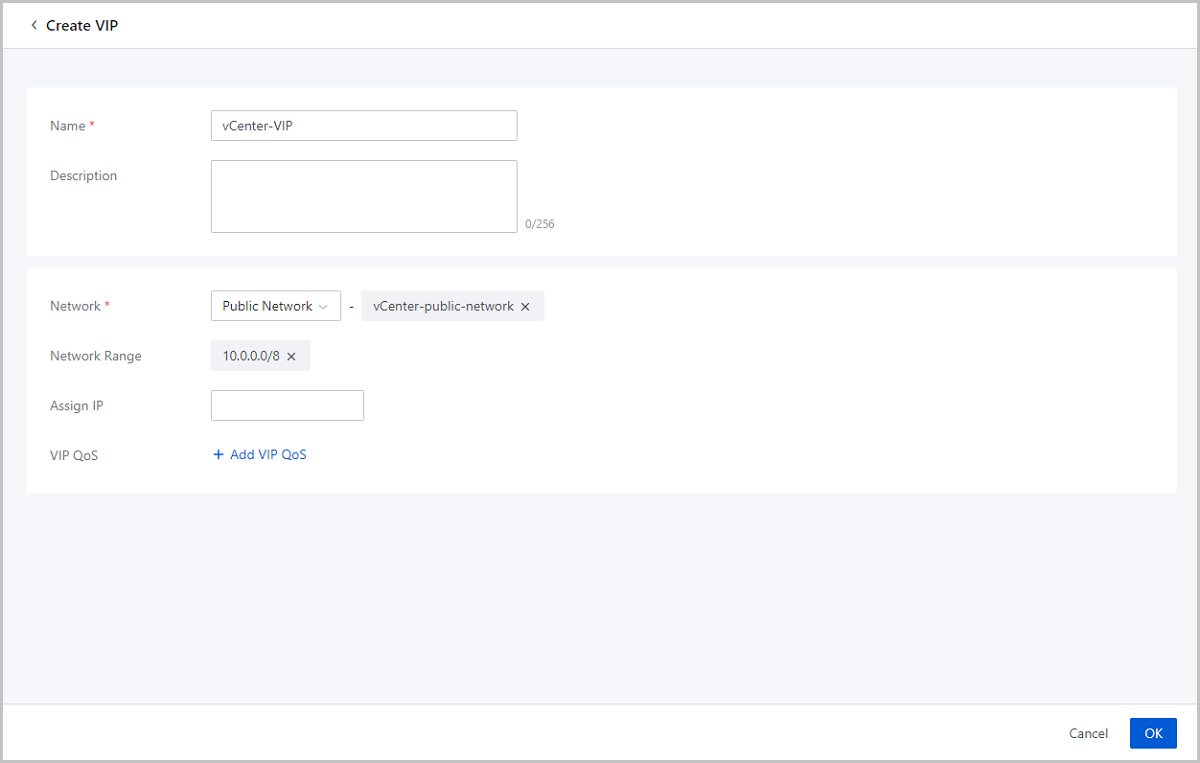VIP (ESX)
VIP Types
- Custom ESX VIP.
- Creation: A custom ESX VIP is manually created by users.
- Network Service:
- The custom VIP in a VPC network environment can be used for network services, such as EIP, port forwarding, load balancing, and IPsec tunnel.
- One custom VIP is used for only one EIP service instance.
- One custom VIP can be used for port forwarding, load
balancing, and IPsec tunnel at the same time, and supports
multiple instances of the same service type.
 Note: Different
types of services cannot use the same port
number.
Note: Different
types of services cannot use the same port
number. - The custom VIP cannot be used across VPC vRouters.
- Deletion:
- Deleting a custom VIP also deletes all services the VIP provides.
- Deleting a service of a custom VIP does not affect other services the VIP provides.
- System ESX VIP.
- Creation:
A system ESX VIP is automatically created by the system after a VPC vRouter is successfully created. This system VIP address is the default public IP address of the routing device.
- Network service:
- The system VIP in a VPC vRouter environment is used for network services, such as port forwarding, load balancing, and IPsec tunnel.
- One system VIP can be used for port forwarding, load
balancing, and IPsec tunnel at the same time, and supports
multiple instances of the same service type.
 Note: Different
types of services cannot use the same port
number.
Note: Different
types of services cannot use the same port
number. - One system VIP corresponds to one VPC vRouter.
- Deletion:
- Deleting a service of a system VIP does not affect other services the VIP provides.
- Deleting a VPC vRouter also deletes the corresponding system VIP and all services the VIP provides.
- Creation:
Create a Custom ESX VIP
The steps of creating a custom ESX VIP are basically the same as that of creating a custom KVM VIP.
On the main menu of ZStack Cloud, choose . On the Custom page, click Create VIP. Then, the Create VIP page is displayed. On the displayed page, set the parameters. For detailed information, you can refer to User Guide.
 Note: For Network, select the public network that you created in
the vCenter.
Note: For Network, select the public network that you created in
the vCenter.
How to Use an ESX VIP
The method of using an ESX VIP is basically the same as that of using a KVM VIP.
- Custom ESX VIP:
A custom ESX VIP in a VPC network environment can be used for network services, such as EIP, port forwarding, load balancing, and IPsec tunnel. To use custom ESX VIP, you can Create a New VIP or Use an Existing VIP. For detailed information, you can refer to User Guide.
- System ESX VIP:
A system ESX VIP in a VPC network environment can be used for network services, such as EIP, port forwarding, load balancing, and IPsec tunnel. The method of using a system ESX VIP is as follows:
On the main menu of ZStack Cloud Private Cloud, choose . On the Port Forwarding, Load Balancing, or IPsec Tunnel page, you can choose to use an existing VIP.
ESX VIP Actions
On the main menu of ZStack Cloud, choose . Then, the VIP page is displayed.
| Action | Description |
|---|---|
| Create VIP | Create a new VIP. |
| Edit VIP | Edit the name and description of the VIP. |
| Delete VIP | Delete the selected VIP. Note: Note:
|